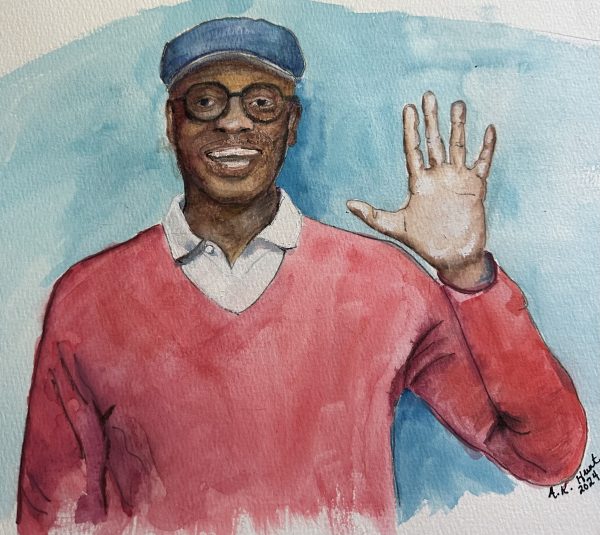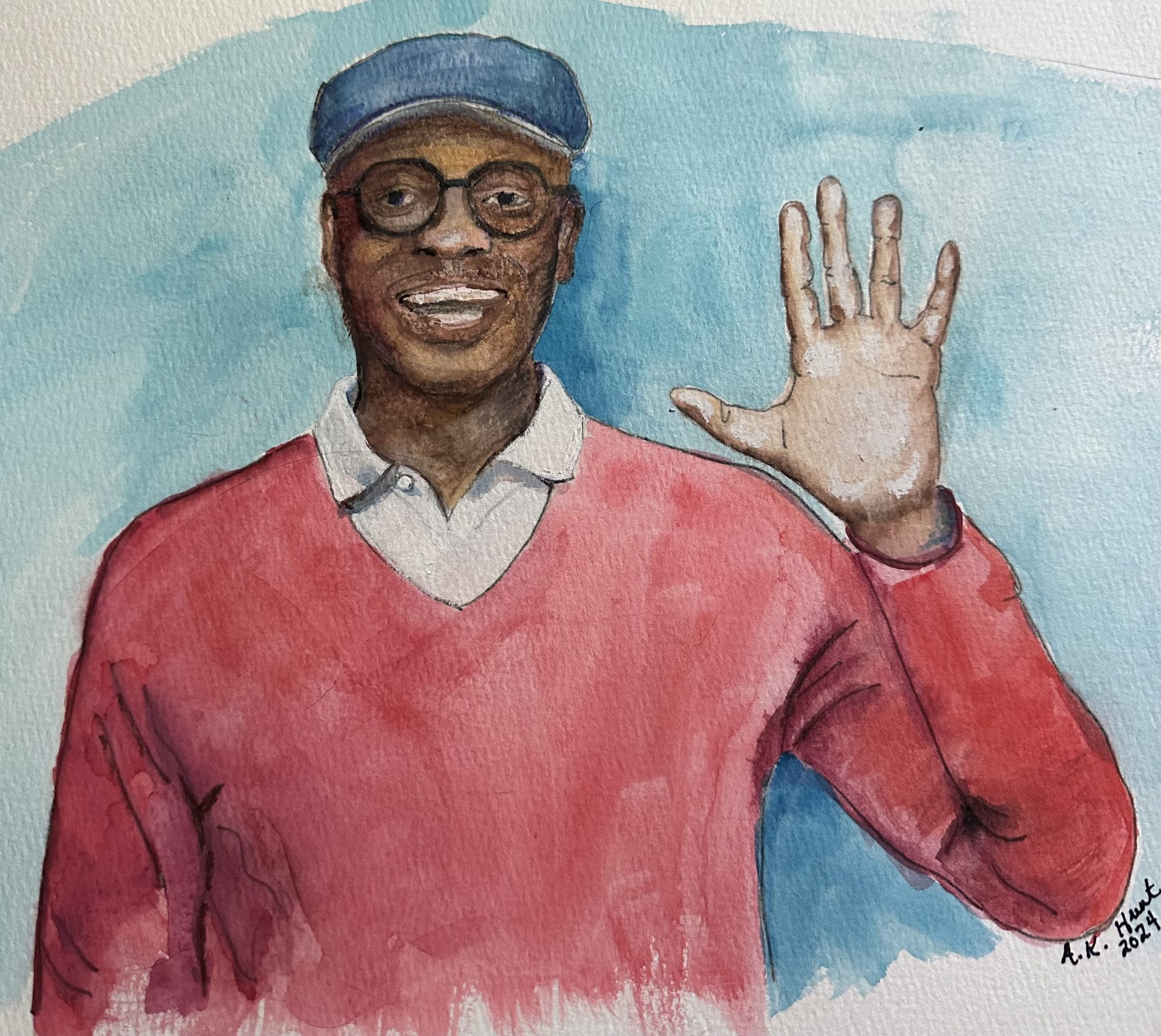All of us recognize that common greetings we give and receive in our culture are usually merely something to say even to friends or acquaintances and especially to strangers and are not designed to express a genuine interest in their day’s experiences. None of my readers should be surprised by the following list of illustrations of this commonplace phenomenon.

“HELLO!” watercolor by Kathy Hunt
1. Good morning, afternoon or evening.
2. How are you doing or, how is it going?
3. Hello, or just Hi.
4. Have a nice day or have a good day.
5. Merry Christmas or happy holidays etc.
6. The wave of a hand with a smile as you pass with nothing said.
How do you usually respond to each of the foregoing? On a deeper reflection, what opportunities are presented to engage the other person in a more personal interest in them and to be a witness that the God who loves each of them would like for you to engage them in a conversation so that His love could be shared? As I am sure you understand, as I have from a lifetime of observations, that almost all of such expressions are not given to ask a question, and in the example of strangers particularly, are not given to even make an acquaintance or friendship but rather are just something to say in a passing encounter on the way to their next task or destination.
So to encourage each of you to look for opportunities that are presented by such encounters, the following suggestions for your possible responses are given.
1.Good morning, good afternoon or evening. You could respond as follows: “Thank you for that greeting. I think this day is presenting you and me with an opportunity to meet and exchange why this is a good morning (afternoon or evening as the case may be). My name is John Woodbery, what is yours? It is my pleasure to meet you. For me, this is a good day because I believe in a God who loves us, and makes each moment a good occasion. How about you?” Depending on the response you receive, you may be given an opportunity to share why God’s love is important in every aspect of our lives. As a personal encouragement, remember that He teaches us to be thankful for any and all things, regardless of the reaction and opportunities presented or lost. I Thess. 5:18.
2. How are you doing or, how is it going? Instead of the meaningless expression “fine, how are you?” response, you could say, “I am doing fine in most categories, especially because my health is reasonably good, and the tasks I have for myself this day give me a positive attitude about this day so far. Also, the family I care about remains in a good relationship with my wife and me. Also, I have in my belief in Christ that His presence is around me even here and now. Is there anything you would like to share with me about yourself?” You probably wouldn’t say much more, depending on the response you receive but remember that Jesus urged us to love our neighbors as ourselves. Matt. 19: 19. I think He meant all that we will meet, even strangers are to be loved as if they were a personal neighbor. See the answer to a challenger’s question based on the Mosaic Law as to who is our neighbor, Jesus gave that answer in the story of the Good Samaritan: Luke 10:27-37. This should encourage us to take the opportunity to witness to even a stranger as presented above.
3. Hello, or just Hi. The typical response we all make or use and an encounter to such a greeting of or own is a return with a “Hello” or “Hi” as well without any attempt to engage the other person personally. The original creation of the expression “hello” came from the old German word “hallo” which was used as a cry for attention or an expression of your own surprise. The earliest common American use of the expression is credited to Thomas Alva Edison or Alexander Graham Bell for its use as a telephone greeting when that ubiquitous invention came into public use. I suggest that the common use today in casual encounters, especially between strangers to each other, is a rather meaningless personal objective and just something to say when a stranger or someone you know but don’t need to talk with is passed. I suggest that you could say in response, “I hear you and thank you for that greeting. I am led by God to be thankful in and for all things and this brief and unexpected encounter is one for which I am thankful.” Where that might lead is difficult to predict, but with God’s purposes for us in mind, with this effort for His purposes it will be only good. Rom. 8:28 .
4. Have a nice day or a good day. I predict that in almost every such greeting you receive from a stranger, or even an acquaintance, there is nothing in that person’s experience that has prompted this greeting, but just something present to say on an unplanned encounter. I suggest the following response as an effort to open an opportunity to share things God may be prompting you to do or say in that even routine and unplanned encounter. You could say, “Thank you for that word of encouragement, or I take it that way anyhow. Without me going into an account of my planned activities which neither of us has time for, I would like to say in response that today as in most of my days, I am trying to make this part of my daily activities a rewarding experience even with each person I meet or circumstances I encounter to get to know them better if that opportunity presents itself. Is there anything happening in your life that is rewarding that you would like to share with me? For me, this day is nice or good as we say, because God loves me and I believe He loves you as well and you have given me the opportunity to share that with you and if you so choose, to share your delights for this day also. It’s up to you, entirely.” This kind of encounter could inspire a further discussion about your faith.
5.Merry Christmas, Happy Holidays, etc. It is quite common from my own experiences that many retail store employees, for example, routinely make this seasonal greeting to everyone they meet in their business day. This is fairly common even in private person to person encounters. Even people you see regularly in church or strangers on the street will use this as a greeting. I suggest you could use as a reply to the merry Christmas greeting, “I am pleased that we all celebrate this season that started in history with the birth of Jesus Christ as well as the date when our calendar we still use started to be counted.” As to the holiday the Fourth of July, I like to say in response, “I am grateful the founders of our country saw and acted on the wisdom of separating from the monarchial form of government under the Kings of England in 1776. It came at a high cost in the loss of American soldiers’ lives, but the benefits have lasted 248 years so far and were inspired by the strong belief by our founders in God, and we have mostly stuck to it. In regard to happiness or not, how does that make you feel?” This could lead to an opportunity to share your faith beliefs further.
6.The wave of a hand with a smile as you pass with nothing said. I find this a common practice. I make an approximate three mile walk most every day on a trail that meanders through residential neighborhoods and a larger portion bordering and going through Willis D. Tucker County Park. In that park and on the trails, many people walk their dogs on leashes and wave and say good morning as they pass you. I try to engage most of them who have stopped for one reason or another and if they have a dog with them, ask about their dog history with them and occasionally share with them about our last two dogs, one of which I named Madison and the other Jefferson in honor of those two favorite characters of mine from the history of the founding of our Republic and its Constitution. I chose the name Madison for the smaller of the two dogs because President Madison was shorter than Jefferson but most responsible for the inclusion of the principle of checks and balances among the legislative, executive and judicial branches of our government. A reporting of this history in any dog discussion with people I meet allows me to also share how our founders were Christians and relied on these foundation principles to preserve our rights to freely worship in the religion of our choice which was back then almost exclusively Christian. I can share that in my opinion that is why our freedoms under a democratic form of government has lasted for 248 years while most if not all other democracies in history collapsed relatively quickly in comparison to the more dictatorial forms that destroyed individual freedoms. I can also repeat that portion of the Pledge of Allegiance to our flag, itself a symbol of our freedoms under our Constitution that says, “One nation under God with liberty and justice for all”. So, even a meaningless wave of a hand in greeting can be turned into an opportunity to witness for Christ.
CONCLUSION
Each reader of this article is probably aware if not personally experienced thereof with the spiritual gifts called “A word of knowledge and prophecy”. If you have experienced those gifts or would like to be used by God through them, be available to allow God to use you in the encounters like those I have described above, including strangers as most of them will be, to speak those words to the persons you encounter as God leads or calls you to do. Just remember, you have to trust in God, no matter what circumstances or persons you encounter and no matter what is presented to you, and He will guide you through it. All of life, including our walk with God and Christ through their Holy Spirit’s leading is a learning and trusting process. I like the expression describing the learning aspect of these faith building encounters, “acts done in trust will lead to trust in future acts”. God bless you as you engage in this ordinary aspect of daily living and the glory it will bring our Lord in the process and results. By this I mean that His plan for each of us will be fulfilled. Col. 1:27

John Woodbery Author. A retired lawyer, John writes novels, short stories, poetry, commentaries on legal subjects, even a song (!). Find his suspense novels on Amazon: Hidden, Earl’s Retreat, Two Tombs Covers.

Leave a Reply